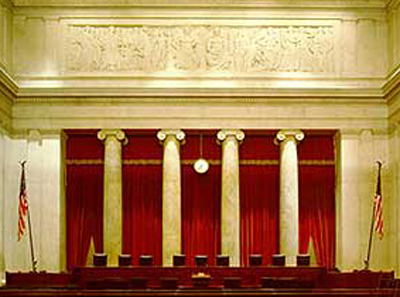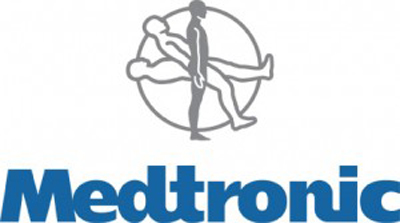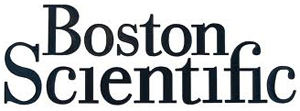 On November 5, 2013, the Supreme Court heard oral arguments in the Medtronic Inc. v. Boston Scientific Corp. case (Supreme Court docket number 12-1128). The sole issue on appeal was who has the burden of proof on the issue of infringement/non-infringement in a declaratory judgment action brought by a licensee under Medlmmune, the licensee (DJ Plaintiff) or the patent holder/licensor. The Federal Circuit had decided that, in such cases, it is the licensee that seeks to disturb the status quo ante, and therefore it should bear the burden of proof. However, if the tenor of the questioning is any indication, it would appear that the Justices did not necessarily agree.
On November 5, 2013, the Supreme Court heard oral arguments in the Medtronic Inc. v. Boston Scientific Corp. case (Supreme Court docket number 12-1128). The sole issue on appeal was who has the burden of proof on the issue of infringement/non-infringement in a declaratory judgment action brought by a licensee under Medlmmune, the licensee (DJ Plaintiff) or the patent holder/licensor. The Federal Circuit had decided that, in such cases, it is the licensee that seeks to disturb the status quo ante, and therefore it should bear the burden of proof. However, if the tenor of the questioning is any indication, it would appear that the Justices did not necessarily agree.
This problem presented by this case is a direct consequence of the Court's MedImmune decision several years ago. In that case (as well as all similarly situated cases that have followed), the parties had entered into a patent licensing agreement, and while the license was maintained, the licensee was under no risk of facing a patent infringement suit. However, the licensee wanted relief from royalty payments related to one of the licensed patents, but at the same time did not want to repudiate the entire contract. Because the patent holder could not bring an infringement suit, there was a question about whether a case or controversy actually existed such that a declaratory judgment action could be brought. The Supreme Court answered in the affirmative, reasoning that "[t]he rule that a plaintiff must destroy a large building, bet the farm, or (as here) risk treble damages and the loss of 80 percent of its business, before seeking a declaration of its actively contested legal rights finds no support in Article III." Medlmmune, Inc. v. Genentech, Inc., 549 U.S. 118, 134 (2007). In other words, the Court created what appeared to be a patent-license exception to the Article III case-or-controversy requirement, because the licensee was not under the threat of an infringement action. Indeed, without repudiation, the patent holder could not even bring a counterclaim of patent infringement in such a case. However, the logical underpinning of this apparently "artificial" satisfaction of the case-or-controversy requirement began to come unhinged when you consider the issue of who bears the burden of proof in such a case. This was all too apparent during the oral argument as the Justices grappled with the issue.
 Interestingly, the Court had minimal questions for Medtronic (the licensee). In fact, most of the questioning during this part of the hearing was directed at ensuring the Justices had a correct understanding of the facts and procedural posture underlying this case. For example, when counsel for Medtronic pointed out that this case was about the ordering of proofs in patent cases, Justice Alito stated that "if that's all that's involved, then the case doesn't seem to amount to quite as much as one might have thought otherwise, does it?" The counsel representing the Solicitor General's office, which argued in favor of Medtronic, faced even less interrogation from the Court. In fact, only three questions were asked by the Justices.
Interestingly, the Court had minimal questions for Medtronic (the licensee). In fact, most of the questioning during this part of the hearing was directed at ensuring the Justices had a correct understanding of the facts and procedural posture underlying this case. For example, when counsel for Medtronic pointed out that this case was about the ordering of proofs in patent cases, Justice Alito stated that "if that's all that's involved, then the case doesn't seem to amount to quite as much as one might have thought otherwise, does it?" The counsel representing the Solicitor General's office, which argued in favor of Medtronic, faced even less interrogation from the Court. In fact, only three questions were asked by the Justices.
 Things got more interesting during the presentation by counsel for Boston Scientific. As opposed to the Federal Circuit, which focused the inquiry on which party was disturbing the status quo, it appeared as though the starting point for the Justices was that the courts should look to the appropriate mirror-image coercive action, as is done in other declaratory judgment actions. Therefore, in this case, the court would focus on the infringement suit that the patent holder would bring if the licensee breached the contract. For example, Chief Justice Roberts referred to this as the "elephant in the room": "the relief they are seeking is protection against the relief that you would be seeking but for the declaratory judgment action." However, this is not exactly correct, because with the license in place, the patent holder could not bring an infringement action. For example, when Justice Kennedy pointed out that "if [the licensee] refused to pay the royalty . . . then there would have been infringement," counsel for Boston Scientific correctly pointed out: "[b]ut then you're changing all the facts around. That's not - - that's not what we're dealing with in this case." The problem is that when you start by looking to what the mirror-image coercive action would be, the burden is pre-determined. Thus, if the Court follows through with this reasoning, they almost certainly will shift the burden of proof back to the patent holder MedImmune-like cases.
Things got more interesting during the presentation by counsel for Boston Scientific. As opposed to the Federal Circuit, which focused the inquiry on which party was disturbing the status quo, it appeared as though the starting point for the Justices was that the courts should look to the appropriate mirror-image coercive action, as is done in other declaratory judgment actions. Therefore, in this case, the court would focus on the infringement suit that the patent holder would bring if the licensee breached the contract. For example, Chief Justice Roberts referred to this as the "elephant in the room": "the relief they are seeking is protection against the relief that you would be seeking but for the declaratory judgment action." However, this is not exactly correct, because with the license in place, the patent holder could not bring an infringement action. For example, when Justice Kennedy pointed out that "if [the licensee] refused to pay the royalty . . . then there would have been infringement," counsel for Boston Scientific correctly pointed out: "[b]ut then you're changing all the facts around. That's not - - that's not what we're dealing with in this case." The problem is that when you start by looking to what the mirror-image coercive action would be, the burden is pre-determined. Thus, if the Court follows through with this reasoning, they almost certainly will shift the burden of proof back to the patent holder MedImmune-like cases.
This is the heart of the problem with the MedImmune decision. Assigning the burden of proof to either party results in a situation that is not necessarily fair to that party, and does not necessarily logically follow. This problem was highlighted by the questions and comments from Justice Scalia, which is interesting considering he was the author of the MedImmune opinion. First, Justice Scalia appeared to be so focused on MedImmune-type declaratory judgment actions that this exceptional-type case appeared to overshadow the typical declaratory-judgment actions. For example, in responding to Boston Scientific's argument that no patent infringement counterclaim could be brought, Justice Scalia stated that it seemed to him "it is often the case in declaratory judgment actions that the defendant in the action cannot counterclaim." This may be true if you are only considering MedImmune-type cases. However, the Article III case-or-controversy requirement necessary for all declaratory-judgment actions almost requires that the DJ defendant be able to bring a counterclaim -- otherwise the requirement would not be met. For example, in patent infringement declaratory-judgment actions (where there is no license), the potential infringer brings suit to gain certainty that it can make, use, or sell its product without fear that a patent will be asserted against it. In such cases, the patent holder is certainly able to bring an infringement counterclaim. In fact, without the threat of such an infringement action, the Article III case-or-controversy requirement would be lacking. Nevertheless, Justice Scalia stated that "[t]he whole purpose of the declaratory judgment statue is to enable you to sue before the other side has a cause of action against you." However, this does not comport with the requirements of Article III. In fact, Justice Scalia summarized the standard in the MedImmune case as: "Basically, the question in each case is whether the facts alleged, under all the circumstances, show that there is a substantial controversy, between parties having adverse legal interests, of sufficient immediacy and reality to warrant the issuance of a declaratory judgment." MedImmune, 549 U.S. at 127. It is because these MedImmune-type actions have a somewhat "artificial" satisfaction of the case-or-controversy requirement (because there is no infringement) that causes the problems that arise in these sorts of cases.
Justice Scalia also brought up the "res judicata problem," which also stems from the artificial nature of these MedImmune-type actions. The hypothetical was explained as such by Justice Scalia:
Let's assume that we put the burden of proof where you want it. Okay? So this declaratory judgment action is defeated. All right? Nonetheless, they say: Still and all, we are going to go ahead and not pay any royalties. And then you bring - - you bring an infringement action, right?
In this hypothetical, the parties would need to relitigate the entire case. This is because in MedImmune-type declaratory judgment action, as Justice Scalia put it, the best that the patent holder can establish "is that [the licensee] didn't prove non-infringement." Or, as Boston Scientific's counsel put it, the issue in the declaratory judgment action is claim coverage, but the issue in the subsequent litigation is infringement. Therefore, there would be no issue preclusion in the subsequent "breach" patent infringement litigation, and therefore the patent holder would need to prove infringement to be entitled to remedies. This "res judicata problem" is an unfortunate consequence of the MedImmune decision.
Finally, the counsel for Boston Scientific continued to stress that it is important to look at what remedy is being sought to determine who has the burden of proof. Because the patent holder cannot seek any remedies, he argued, the burden should be with the licensee. The Court did not seem convinced. Interestingly, near the end of the hearing, Justice Scalia appeared to have recognized the sought-after remedy in this case:
[T]hey don't want to continue to pay royalties. That's the point. That's why they bring the Declaratory Judgment Act [sic], so that the court can tell them: You don't have to pay royalties because this stuff is not covered.
To this, counsel for Boston Scientific responded: "that's absolutely right." If the Court focuses on this remedy, instead of analyzing what the mirror-image coercive action would be, it is possible that it could require the licensee to bear the burden of proof in these cases. Nevertheless, it did not appear that the Justices were convinced that the burden should be any different in MedImmune-type cases than they are in standard "mirror-image coercive" declaratory-judgment actions.
Of course, it is impossible to be certain what the outcome of any case will be based on the questioning from the bench. We will, of course, provide an analysis when the Court issues its opinion, which should occur before the end of June, 2014.